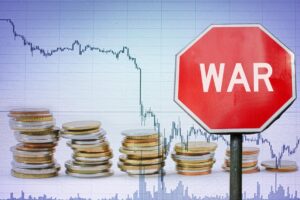War, throughout history, among many other things, has also been a disruptive force with profound and lasting effects on various facets of human existence. The economy is one of the most significant areas where the repercussions of war are felt.

Immediate Economic Impact
The onset of war triggered an immediate economic shockwave. Resources that would otherwise be allocated to productive sectors are diverted to fund the military, leading to a surge in government spending. As a result, inflation often rises, and fiscal deficits may widen. The strain on resources can also lead to increased taxation, impacting both individuals and businesses.
Destruction of Infrastructure
Wars are notorious for causing widespread destruction of infrastructure, including transportation networks, factories, and communication systems
This damage not only costs money but also slows down work and messes up the supply chains. The reconstruction process becomes a significant economic undertaking, requiring substantial investments and diverting resources away from other potential growth areas.
Displacement of Labor
War often results in the displacement of populations, forcing people to flee their homes in search of safety. This mass movement of people can lead to a strain on labour markets, with an oversupply of labour in some areas and a shortage in others. The resultant dislocation can cause economic imbalances and contribute to social and economic inequality.
Impact on Trade
International trade is significantly affected by war. The disruption of shipping routes, imposition of trade barriers, and diplomatic tensions can lead to a decline in global trade. Countries heavily reliant on exports may experience economic downturns, as markets shrink and demand for goods and services decreases.
Resource Shortage
War consumes vast resources, including fuel, metals, and agricultural products. The diversion of these resources to the military effort can result in scarcity in other sectors, driving up prices and further contributing to inflation. Resource scarcity may persist long after the conflict has ended, hindering economic recovery.
Long-Term Economic Consequences
The scars of war extend far beyond the immediate conflict. High levels of public debt incurred during wartime can burden economies for decades. The need for ongoing military expenditures and the cost of veterans’ care add to the long-term financial strain. Additionally, the psychological impact of war can lead to a cautious investment climate, delaying economic growth.
Investment in DefenseIndustries
Oddly, while war can devastate certain sectors, it can also stimulate growth in defence industries. Governments often invest heavily in the development and production of military technology, creating jobs and driving innovation. However, the sustainability of such growth is questionable, it depends on the continuation of conflict.
